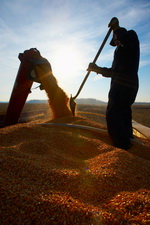
New Study Reveals Eliminating GMOs would Take Toll on Environment, Economies
March 2, 2016| |
 What happens if genetically modified (GM) crops were banned from US farm fields?
What happens if genetically modified (GM) crops were banned from US farm fields?
A Purdue University study conducted by Wally Tyner, James and Lois Ackerman Professor of Agricultural Economics; Farzad Taheripour, research associate professor of agricultural economics; and Harry Mahaffey, agricultural economics graduate student, presented the significant crop yield loss and other economic effects of banning GM crops in the US.
The economists gathered data and found that 18 million farmers in 28 countries planted about 181 million hectares of GM crops in 2014, with about 40 percent of that in the US. They fed the data into the Purdue developed GTAPBIO model, to examine economic consequences of changes to agricultural, energy, trade and environmental policies.
The model showed that if all genetically modified organisms (GMOs) in the US will be eliminated, corn yield declines at 11.2 percent on average, soybeans lose 5.2 percent of their yields, and cotton at 18.6 percent. Around 102,000 hectares of US forest and pasture would have to be converted to cropland and 1.1 million hectares globally for the average case. Greenhouse gas emissions will increase significantly as more land is needed for agricultural production, and commodity prices will rise at 1-2 percent or $14 billion to $24 billion per year. With lower crop yields without GMOs, corn prices would increase as much as 28 percent and soybeans as much as 22 percent, according to the study.
For more details about this study, read the news release at the Purdue University Agricultural News.
| |
Biotech Updates is a weekly newsletter of ISAAA, a not-for-profit organization. It is distributed for free to over 22,000 subscribers worldwide to inform them about the key developments in biosciences, especially in biotechnology. Your support will help us in our mission to feed the world with knowledge. You can help by donating as little as $10.
-
See more articles:
-
News from Around the World
- International Team Decodes Mesoamerican Bean Genome
- Researchers Find Molecular Marker for Calcium in Potatoes
- New Study Reveals Eliminating GMOs would Take Toll on Environment, Economies
- Study Shows Plants Forget Unused Memories
- Filipino Farmer Leaders Learn from Bt Brinjal Farmers in Bangladesh
- Genome Sequence of Cultivated Groundnut Completed
- Wageningen UR Develops Method for Selecting Plants with Better Photosynthesis
-
Research Highlights
- Overexpression of PslTIR1 in Tomato alters Fruit Shelf-life Characteristics
- Mutated Garlic Gene Expressed in Rice Confers Resistance to Sheath Blight
- Expression of Tomato Prosystemin in Tobacco Enhances Plant Resistance to Botrytis cinerea
-
Beyond Crop Biotech
- Bacteria Take "Mug Shots" of Threatening Viruses
- University of Missouri Scientists Breed PRRS Resistant Pigs using CRISPR
-
From the BICs
- UBIC Holds Meeting for Biotech Communication Stakeholders
-
Announcements
- 5th International Conference and Exhibition on Metabolomics
- 3rd Plant Genomics Congress: Asia
-
Read the latest: - Biotech Updates (January 21, 2026)
- Gene Editing Supplement (January 28, 2026)
- Gene Drive Supplement (February 22, 2023)
-
Subscribe to BU: - Share
- Tweet
